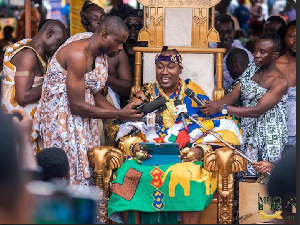Odomase in the Bono Region hosted the Grand Durbar of Meko Bono 2025 under the theme “From Unity, Heritage to Prosperity.” The week-long festival (August 4–9, with pre-events from August 1–3) brought together chiefs, government officials, youth, creatives, and diaspora communities for a celebration that blended pageantry with purpose.
Paramount Chief of the Atebubu Traditional Area, Ohempon Dr Yeboah Asiamah, who chaired the durbar, called unity “ancestral, not accidental” and urged the Bono people to package, protect, and project their heritage for global relevance.
Founded by Nana Ama Kwakye, Meko Bono has grown into a unifying social movement featuring cultural performances, food bazaars, beauty pageants, health screenings, and street carnivals, culminating in the grand durbar as a platform for cultural pride and socio-economic dialogue.
Speakers stressed that unity must be matched with development participation and good governance:
Osagyefo Oseadeayo Dr Agyemang Badu (Dormaa) urged chiefs to work together to drive Bono’s development.
Odomfour Dr Kwasi Apraku III (Odumase No. 1) emphasised unity and love as the foundation for progress.
Nana Ama Ayensua Saara III (Denkyira Hemaa) described the festival as a homecoming for Bono people worldwide.
Osei-Kyei-Mensah Bonsu, representing former Vice President Dr Mahamudu Bawumia, called for action on chieftaincy disputes and stronger partnerships with local assemblies.
Bono Regional Minister, Joseph Addae Akwaboah, urged pride in speaking Bono and faster dispute resolution.
Bono East Regional Minister, Francis Owusu Antwi, called for a centralised traditional authority to restore dignity in leadership.
Speakers highlighted Bono’s rich traditions, drumming, weaving, brass casting, herbal medicine, not just as cultural relics but as engines for livelihoods. Plans include artisan training, diaspora investment tours, and a Bono Heritage Centre.
Festival founder Nana Ama Kwakye likened the durbar to a royal summons for collective work, urging the youth to innovate with identity and the diaspora to invest, volunteer, and build with Bonoman.
Closing with the proverb, “Ɔsono na ɔma nsuo yɛ fitaa” (“It is the elephant that stirs the water to clarity”), the durbar ended with a charge for Bonoman to be steady, strong, and unafraid to stir change—turning cultural memory into modern momentum.

